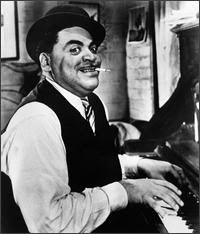Dizzy Gillespie
I could very easily have titled this post "The Case For Art Tatum". He was and remains quite a divisive figure in jazz. There is absolutely no doubting the man's talent when it came to putting fingers onto piano keys. His technique was absolutely sublime and would stop people in their tracks, especially back in the 1930's when he burst on to the scene. Check out Tea For Two his first solo recording from 1932, which remains his most famous track.
I don't think one key on the piano remained untouched! It's also astounding to think that Tatum was almost blind from an early age as well. He was a child prodigy and later was heavily influenced by the popular stride pianists of the 20's including Fats Waller and James P Johnson. It was however the intricate playing of Earl Hines that appeared to have the most effect on him. He preferred to play solo rather than with a band and he was one of the pioneers of early piano jazz soloing that would be exploited more fully by the bebop players in the 40's.
He pretty much scared the bejeesus out of anyone who considered themselves to be a piano player back in the 1930's. After hearing Tatum for the first time Les Paul(!) claimed that "I quit playing the piano right then and there and went to the guitar." Even Fats Waller, who was no slouch, is reported to have said when Tatum showed up at one of his shows, "I only play the piano, but tonight God is in the house". Pianist Teddy Wilson put it very nicely when he said, "Put a piano in a room, just a bare piano. Then you get all the finest jazz pianists in the world and let them play in the presence of Art Tatum. Then let Art play. Everyone there will sound like an amateur."
Have a look at this short video of Clint Eastwood chatting with Ray Charles about their mutual respect for Art Tatum. There is some fantastic (and quite rare) footage of Tatum himself in the clip.
He was quite the antithesis of a player like Count Basie who liked to play sparse notes and preferred the rhythm section to take care of the bass lines. And herein lies the problem with Art Tatum. He never played one note when he could play ten for which he received criticism. Les Paul, although a fan of Tatum, pinpointed the problem by saying that Tatum's musical ability put him at odds with the general listener. "The more talented (a player) is, the thinner the air gets. When you have that ability it's hard to restrict yourself to playing something as stupid as the melody!"
From my point of view I can see both sides and I would compare Tatum in guitar terms with someone like Yngwie Malmsteen. Their technique is beyond question. Yet listening to both of them for any length of time can be tiresome. Luckily Tatum did make some really fantastic recordings towards the end of his career in a band setting with superb musicians who were able to keep up with and in some ways reign him back into the songs he was playing. I'll sign off with this great track that he did in collaboration with Benny Carter on alto sax and Louis Bellson on drums. Called Blues In C the song really shows how he could combine his pyrotechnics with a wonderful bluesy after hours feel.

